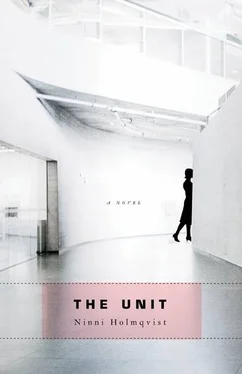I stood with my back to the surveillance camera on the ceiling, fumbling with the dress, skirt and blouse I’d just taken out of my bag, then opened the closet door to hang them up-and that was when I saw there was a camera in there too. It was pointing straight at me, and it made me feel as if I’d been caught red-handed. I could feel myself blushing. Then I got angry, gave the camera the finger, put my clothes resolutely on hangers and shut the door on them.
I had also packed a couple of books, and I put them on a side table in the living room for the time being; I placed my laptop on the desk in the alcove. I put my favorite pen, a notepad and an envelope containing some photographs in the drawer of the bedside table.
The envelope contained a photo of Jock, one of Nils, one of my house and one of my family from when I was a child. It was a Polaroid, taken on the sofa in my parents’ house. Mom and Dad in the center, Mom with the baby, Ole, on her knee. Next to her Ida and me, and next to Dad the two eldest, Jens and Siv, sitting close together. We’re all smiling. Ida and I are actually laughing. I was eight when the picture was taken by Mom’s best friend; I remember I really liked her a lot. She loved kids but had none of her own, and she’d insisted on taking a photo of us all with her new Polaroid camera that day. It was actually the only photo of the whole family gathered together, so I was glad she’d got her way. Unfortunately, I can’t remember her name.
My family was all over the place now, scattered to the winds like a dandelion clock. Both my parents had died a long time ago. If they had still been alive, I could probably have received a dispensation for a few years to look after them. Jens, Ida and Ole had families of their own, living and working in different parts of Europe. My older sister Siv didn’t exist anymore, at least I didn’t think so. She had no children and was seven years older than me, so the probability that she might still be alive wasn’t particularly great, that’s if she had become dispensable-I didn’t even know that much for certain.
I finished unpacking, pushed my suitcase, peacoat and winter boots into the top part of the closet, then began-indifferently at first, then restlessly, finally almost manically-wandering to and fro through the two rooms and into the bathroom; I turned on the faucets, flushed the toilet, opened drawers and cabinets, checked out the appliances in the kitchen, made sure the refrigerator and freezer were on and that the ice maker, ceramic cooktop, convection oven, microwave and kettle were all working. Went over to the alcove and sat down on the chair in front of the desk. It was a nice chair, made of molded wood, but it wasn’t particularly comfortable. It didn’t give support to the lower back, but higher up, just below the shoulder blades, and there were no arms. I knew from experience that if I sat and wrote for just a few hours a day on a chair of this quality, I would have an aching back and shoulders within a week. But I was sure I would get a better chair if I asked for one. From now on it was important that I was kept in good condition and good health in every way. That was the whole point, after all.
I got up from the chair and went over to the sofa to try that out. It was wonderful, both to sit on and to lie on. I settled down and picked up the remote from the coffee table, pointed it at the TV, pressed a button at random and the picture quickly appeared. It was a German channel broadcasting a talk show. I flipped here and there, established that there appeared to be lots and lots of channels, and that at least the world came here, even if I couldn’t reach the outside from now on, not by mail, e-mail, text messages or telephone calls. From now on the telephone existed for me only in the form of a fixed internal line, and as for the Internet, I was allowed to surf only under supervision, which meant an orderly or another member of staff sitting beside me, and I was not allowed to join chat forums, contribute to blogs, create or respond to advertisements, or vote in opinion polls.
After flipping at top speed through fifty or so channels, I switched off the television, got up from the sofa, stretched, then looked around the room. What should I do now? A glance at the clock on the DVD player under the TV told me there was still quite a while before the meeting at two o’clock. This was not good. I’d begun to get the creeps. Whether it was from anxiety or anger, I didn’t know and I didn’t want to know. If there had been a window I would have gone and stood by it to look out. That usually had a calming effect on me, standing by a window and looking out. But-I only realized it now-there were no windows, not anywhere. I had probably registered it subconsciously as soon as I was shown into the apartment, but it was only now that it struck me. No windows. And yet it was daylight in here. How could that be? Nor did the light appear to be coming from any kind of lamp. It didn’t seem to be falling in a particular direction; it was more that the room seemed to be filled by it. I looked around the living room in confusion. The only light that was on was the bulb above the sink in the kitchenette. In a vain attempt to solve the mystery, I went over and switched it off, but it didn’t make much difference. I gave up.
It wasn’t until a couple of days later that I found out about the daylight. It was when I got on top of a chair to put a shelf above the alcove where the desk was. I happened to glance up at one of the rectangular air vents mounted in the walls, high up, close to the ceiling, a couple in each room. They turned out not to be air vents at all, because when I was standing on the chair looking diagonally through the upwardly angled slats- roughly like Venetian blinds when you adjust them to let in the light, but not direct sunlight-I was dazzled by the harsh white glare of the diodes inside.
Because I couldn’t go and stand by a window to calm myself down, and because the creepy feeling in my body was threatening to get out of hand and take over, I wondered about going to the lounge or maybe knocking on Majken’s door. But when I thought about it, I didn’t feel ready. I was also very tired, so I went into the bedroom and lay down on one side of the double bed. Lay there, looking up at the ceiling and trying not to think. Took deep breaths and concentrated on exhaling slowly. After a while I must have fallen asleep, because when a loudspeaker somewhere in the room suddenly crackled, I opened my eyes with a start. The crackling gave way to a friendly exhortation from a male voice:
“This is a message for today’s new arrivals. We would like to remind you that the obligatory welcome and orientation meeting will be taking place in conference room D4 in ten minutes. You will find conference room D4 on staircase D on the fourth floor. The easiest way is to take the optional elevator down to level K1, follow the blue corridor then take elevator D up to the fourth floor. Welcome, everyone! End of message.”
There were eight of us. Only two were men, which wasn’t that strange as the age limit for them is sixty. It’s perfectly natural; after all, they produce viable sperm much later in life than we produce eggs. Even so, I had thought for a long time that the difference in age limits for men and women was unfair. That is until Nils informed me that there were lots of men-I think he even knew a few-who had been conned out of parenthood by women who just wanted free sperm.
“It’s really only fair that men get more time, so stop moaning!”
I was very upset when he said that, not least because I felt found out. One of the reasons I had sex with Nils was that I secretly hoped the condom he so carefully slid over his penis before we had intercourse might split. I also made sure we got together immediately before or during ovulation. But it was also his harsh words, and the hardness in his voice when he said them, that upset me, and from then on I never spoke to Nils about my anxiety as I approached my fiftieth birthday.
Читать дальше












